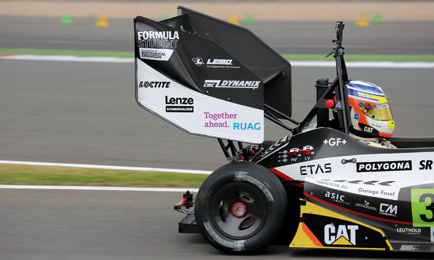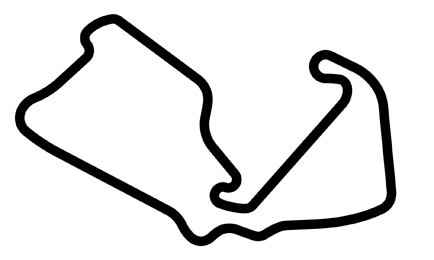Formula Student shows no sign of running out of steam. The four-day competition, which takes place later this month, is now 17 years old, and is set to attract a record number of teams from all four corners of the globe.
The event’s enduring popularity can be attributed to the unrivalled all-round experience that it offers to those who compete. Teams of engineering students design and build a one-seater racing car, before getting the chance to put it through its paces around the historic Silverstone track. But the teams also have to think about non-technical issues, such as marketing and presentation. All this demands a wide-ranging package of skills that prepares the budding engineers for their first roles in industry.
Perhaps that’s why Formula Student has also proved so popular with sponsoring companies such as Jaguar Land Rover and Mercedes-AMG. These organisations get to cast their eye over the emerging engineering talent who might like to join them once their studies are over. The event has acted as the springboard for dozens of youngsters who have gone on to win exciting jobs at the very best racing teams.
Such has been the success of Formula Student that its organiser, the Institution of Mechanical Engineers, has started to roll out the format into other sectors. Similar competitions have been launched challenging students to design railway locomotives and unmanned aerial systems. Both have attracted teams from top-notch universities and have been established as yearly events.
Undergraduates who have taken part in Formula Student and have gone on to secure exciting positions are fulsome in their praise of the experience it offered. Andy Ringland competed in the event in 2004 and 2005 while studying mechanical engineering at Lancaster University. He says he enjoyed the technical challenge that the competition offered, along with the team-working and camaraderie. He admits that the event was hard work, and ultra-competitive. But it struck a chord with his love of automotive engineering, and he was keen to stay involved. “Something got into my blood,” he says. “And I needed to get that fix again. That fix was coming back and volunteering.”
Ringland went on to become a ‘scrutineer’, one of the valuable team of judges and assessors who help the event tick over in a slick and organised manner. He then became a chief event captain, leading a team of 30 volunteers to deliver the highly polished dynamic events that comprise all the competitive on-track racing elements of the competition.
He says: “What I loved about Formula Student was the achievement it gave. I used it to develop both professionally and personally. And I wanted to provide those opportunities for others.”
His role as chief event captain involves making key decisions about the competition’s future structure. “That’s one of the challenges of being involved,” he says. “It’s always different. Every year we make improvements. We review what happened last time and find out what could have gone better. Then we implement those changes, but that then highlights other areas where improvements could be made. Every year is equally hard work, but it’s equally rewarding because you overcome those challenges.”

Being involved in Formula Student has had a positive impact on Ringland’s career. He has enjoyed swift progression since leaving university, and is now technical director at Manchester-based Crookes Walker Consulting. “That’s one of the advantages of being involved in Formula Student,” he says. “It’s not just the student side.
“It challenges every skill from man management to negotiations and complaint resolution in a highly pressured and frenetic environment. It’s massively influential in the lives of engineers once they have graduated and become professional, developing engineers.”
There are plenty of other stories of graduates who have taken part in Formula Student and gone on to forge successful careers. Such has been the strength of the legacy that it has created that the IMechE has decided to launch similar events in other areas. The Railway Challenge, for instance, brings together teams of students, apprentices and graduates and challenges them to design a prototype locomotive, culminating in a competition over a weekend at the Stapleford Miniature Railway near Melton Mowbray.
The students are required to design and manufacture a miniature (10¼-inch gauge) locomotive in accordance with a set of rules and a technical specification. At the end of each academic year, the teams compete against each other to test their designs and determine a winner.
For the purpose of the competition, teams assume they work for a design consultancy producing a locomotive for a large corporation. They have to make a prototype and then test it against locomotives manufactured by the other teams. The challenges involve energy efficiency, energy storage, traction, ride comfort, noise, maintainability and presentation.
Luke Foy, team captain for Transport for London, the 2014 winners of the Railway Challenge, says it was the all-encompassing nature of the event that encouraged his team to compete. “Taking part helped us gain first-hand experience of the whole process of developing a locomotive,” he says.
Similarly, the Unmanned Aircraft Systems (UAS) Challenge asks teams of undergraduates to undertake a full design and build cycle of a UAS with specific mission objectives across the academic year – before competing in a final ‘fly off’. Throughout the competition, students get to demonstrate their technical, design and manufacturing skills, learn key team-working, time management, project management, budgeting and presentation skills – and become better equipped for a career in aerospace engineering.
“The event has three key aims: recruitment opportunities for industry, employment opportunities for soon-to-be graduates, and a proving ground for innovation,” says John Turton, chairman of the UAS Challenge. “It will assist students to learn practical aerospace engineering skills for industry, prepare students for employment and encourage links between industry and universities.
“The competition directly supports the institution’s objectives of inspiring young people about engineering and developing awareness of engineering and profile of the Institution.”
Both the Railway and UAS Challenges were due to take place just before this issue of PE was printed. Full coverage of the competitions, and the winners, will be published on imeche.org/news.

Go and watch Formula Student Formula Student takes place from 9 to 12 July at Silverstone, the historic home of the British Grand Prix. The event is at maximum capacity in terms of entries, with more than 125 teams registered to take part. Around half of the teams are from UK universities, but there are entries from all around the world, including the Ukraine, Egypt, Nigeria, Pakistan and India. Tickets to attend as a spectator are still available, and can be found at shop.imeche.org/fs-tickets.